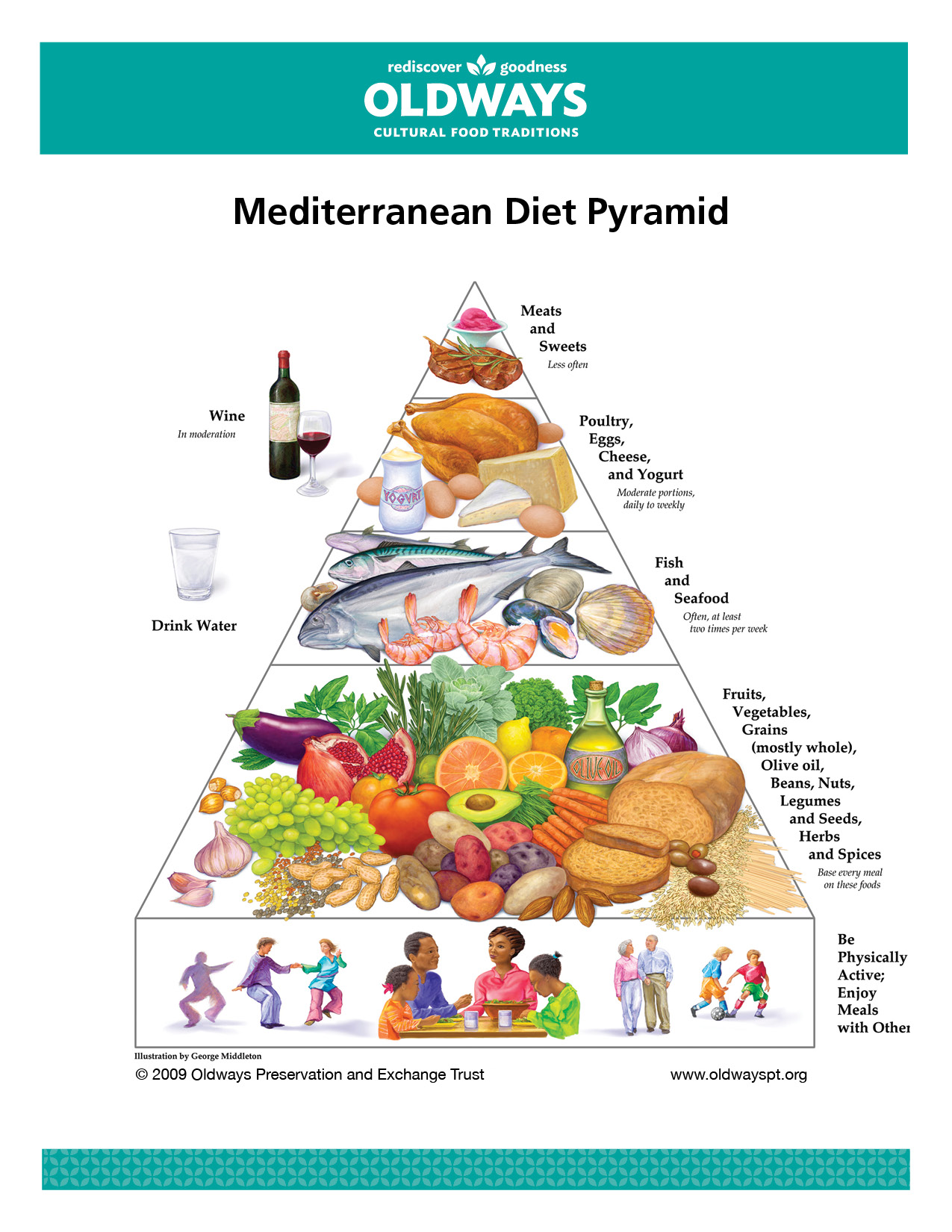
If you regularly watch health docs on streaming sites, you’ve probably watched the ‘Live to 100: Secrets of the Blue Zones’ series hosted by author Dan Buettner where he visits five communities where people live extraordinarily long and vibrant lives.
One of the strongest episodes was Episode One in Okinawa, Japan, which inspired publishing this article: Want to Live Long? Learn Longevity Secrets from Japan’s elderly.
But another strong episode that made a mark was when Buettner traveled to the Greek island of Ikaria. There, the elders’ diet consists of legumes, wild greens, potatoes, goat milk, honey, fruits, and small amounts of fish, also known as the Mediterranean Diet.
According to US News and World Report, the Mediterranean diet ranked first as the best diet of 2024, beating other diets like Mayo Clinic, Flexitarian Diet, and Vegan Diet.
It’s delicious and nutritious, and if Buttner’s documentary is to be believed, the Mediterranean Diet can help you age gracefully and live a long and healthy life. The best part? You don’t have to live in the Mediterranean to reap its many health benefits.

What is the Mediterranean Diet?
The Mediterranean Diet is a way of eating that prioritizes the consumption of fruits, vegetables, legumes, herbs and spices, and whole grains while minimizing the intake of heavily processed foods and reducing meat compared to a standard Western diet.
In the 1950s, a Minnesota physiologist named Ancel Keys brought together researchers from all over the world to study heart and vascular diseases among countries with varied lifestyles and eating patterns in a study called Seven Countries.
The researchers noticed a pattern among peoples who lived around the Mediterranean seas. They noted lower rates of cardiovascular diseases and longer life expectancy, linking it to their eating habits, and over time this became known as the Mediterranean diet.
In 1993, the Harvard School of Public Health and the WHO partnered to create the Mediterranean Diet Pyramid.
Starting at the pyramid’s base, activity and social connections are emphasized. Moving upward, you’ll see the core foods that make up this diet: whole grains, fruits, vegetables, beans, herbs, spices, nuts, and healthy fats such as olive oil.
Fish and seafood are typically eaten at least twice a week, and dairy foods – especially fermented dairy like yogurt and traditional cheese – are eaten frequently but in moderate portions.
Eggs and occasional poultry are also part of the Mediterranean diet, but red meat and sweets are rarely eaten. In terms of beverage, water is mostly drunk, while wine is acceptable for social and moderate drinking (READ MORE: Is Drinking Wine Good For You?) and typically taken with meals.

Why is it a popular diet?
The beauty of the Mediterranean diet is that it is open-ended and non-restrictive. Counting calories? Not required. Regimented schedule? No need. It’s a flexible and easy-to-follow diet.
“The Mediterranean diet contains healthy elements from all food groups: whole grains, which are complex carbs, healthy fats such as olive oil and omega-3 fatty acids, and lean protein,” says cardiologist and associate professor at the NYU, Nieca Goldberg interviewed in this National Geographic feature. She adds, “There’s something for everyone in this diet.”
“The Mediterranean diet isn’t as much a strict plan as it is a lifestyle. It’s very easy to follow, very sustainable, and very realistic,” says Julia Zampano, a registered dietitian who acted as a resource for this New York Times story. She adds, “People who follow this tend to eat foods their grandparents would recognize.”
Because it’s not a strictly-regimented eating plan (in fact, it might be incorrect to call it a “diet”), there is no single definition for the Mediterranean way of eating.
“The Mediterranean diet encompasses the eating pattern of all 16 countries around the Mediterranean sea, including parts of Europe, Asia, and Africa,” explains Liz Weinandy, an outpatient dietician at Ohio State University Medical Center, as quoted in this article. She praised the Mediterranean diet, saying “It’s healthy for anyone of any age who’s looking to follow an overall eating plan that benefits every part of the body.”

What are the health benefits?
Embracing the Mediterranean diet is not only simple and easy, it’s also about reaping numerous health rewards.
Lowers risk of cardiovascular disease
Research shows that eating a Mediterranean-style diet can reduce your risk of having a heart attack, and other cardiovascular complications, such as high cholesterol; and high blood pressure.
A notable feature of the Mediterranean diet involves favoring monounsaturated fats like olive oil over saturated fats such as butter.
According to the Harvard School of Medicine, a study of nearly 26,000 women found that those who followed a Mediterranean diet had 25% less risk of developing heart diseases over the course of 12 years. This study examined underlying mechanisms such as changes in inflammation, blood sugar, and body mass index as the biggest drivers.
In yet another convincing study, 7.000 men and women who had diabetes and other heart risk factors found that a Mediterranean diet supplemented with extra virgin olive oil or nuts and without any fat, coupled with calorie restrictions, reduced the rates of death from stroke by 30%.
Boosts brain health
Not only is the Mediterranean diet linked to lower cardiovascular diseases, but also shows promise in mitigating neurodegenerative diseases such as Alzheimer’s and Parkinson’s.
In a 2022 study of JAMA Network Open, researchers found that Hispanic adults who stuck to the diet had better overall cognition compared to those who did not adhere consistently, proving it can help with lowering the risk of age-related cognitive decline.
The Mediterranean diet has been linked to various mental health advantages, including enhanced mental well-being, reduced incidences of anxiety and depression, and a generally improved mood.
Lowering inflammation and insulin sensitivity
Scaling back on processed foods and substituting with fresh whole foods is the benchmark of the Mediterranean diet, which reduces inflammation by a thousand leagues. The Mediterranean diet is also widely known as an anti-inflammatory diet.
The American Diabetes Association published a report reviewing several eating plans that have been shown to help people with diabetes. One of the most researched has been Mediterranean-style eating, with benefits such as improved A1C levels, cholesterol, and heart health.
(READ MORE: Staying Healthy With An Anti-Inflammatory Diet)

Lower Cancer Rates
Meanwhile, following a Mediterranean diet has been linked with a decreased incidence of various forms of cancer, particularly breast cancer. In this study, the researchers found that the Mediterranean diet may protect men and women from breast cancer thanks to a regular intake of fiber, antioxidants, and anti-inflammatory nutrients.
(READ MORE: How to Make Salads Exciting)
Good for humans and the planet
The Mediterranean diet’s emphasis on plant-based foods such as fruits, vegetables, legumes, and whole grains contributes to reduced greenhouse gas emissions and land use compared to diets rich in animal products. Moreover, by promoting locally sourced and seasonal ingredients, the diet aligns with principles of environmental sustainability by reducing the carbon footprint associated with food transportation. The Mediterranean diet emerges as a win-win solution, benefiting both human well-being and the health of the planet.
(READ MORE: Eat More Plants, Save the Planet)
Many other benefits
And besides the ones mentioned above, there are seemingly minor yet impressive benefits that contribute to improving your overall health status. This includes:
- Clearer skin
- Decreased muscle pain
- Less headaches
- Improved sleep
- Less anxiety and brain fog
- Less bloating
- More energy
- And weight maintenance
How to Start
When adhering to the Mediterranean diet, the focus is on consuming predominantly plant-based and whole foods. Screenshot this list.
Food to include:
- Fish (salmon, tuna, herring, etc.)
- Seafood
- Poultry, in moderation
- Vegetables
- Fruits
- Dairy products
- Eggs, in moderation
- Olive oil
- Chickpeas
- Lentils
- Quinoa
- Pasta
- Yogurt, in moderation
- Nuts
- 100% whole-wheat bread
- Herbs
- Spices
- A glass of red wine with meals (no more than one glass for women, two glasses for men)
- A bit of dark chocolate
Food to Avoid or moderate:
- Red meats
- Sugary foods and drinks
- Processed foods
- Butter
Go and make yourself a weekly or daily meal plan. This meal plan from Eating Well is a great start.
As the old adage goes, “you are what you eat.” If you’re eager to kickstart healthier habits, look no further than the Mediterranean Diet. Consistently hailed as the top diet in the last seven years, it’s earned its reputation for good reason.
Not only is it sustainable and delicious, but it also feels more like a lifestyle than a restrictive diet. With a few adjustments, motivation, and self-control, you can achieve good health and well-being through the Mediterranean diet.
Tags
References:
https://www.hsph.harvard.edu/nutritionsource/healthy-weight/diet-reviews/mediterranean-diet/
https://www.cdc.gov/diabetes/library/features/mediterranean-style-eating.html
https://www.nationalgeographic.com/https://www.tasteofhome.com/article/mediterranean-diet/
https://www.nytimes.com/2023/01/06/well/eat/mediterranean-diet-health.html
https://www.cnet.com/health/nutrition



0 Comments